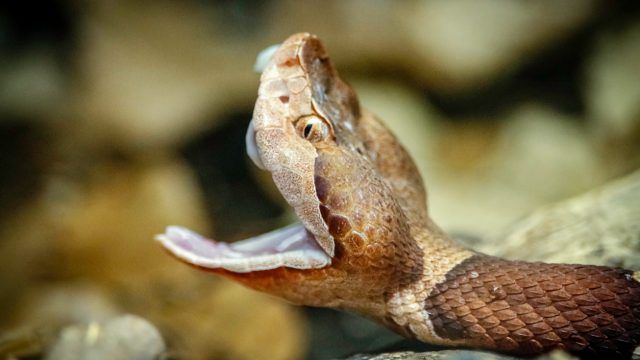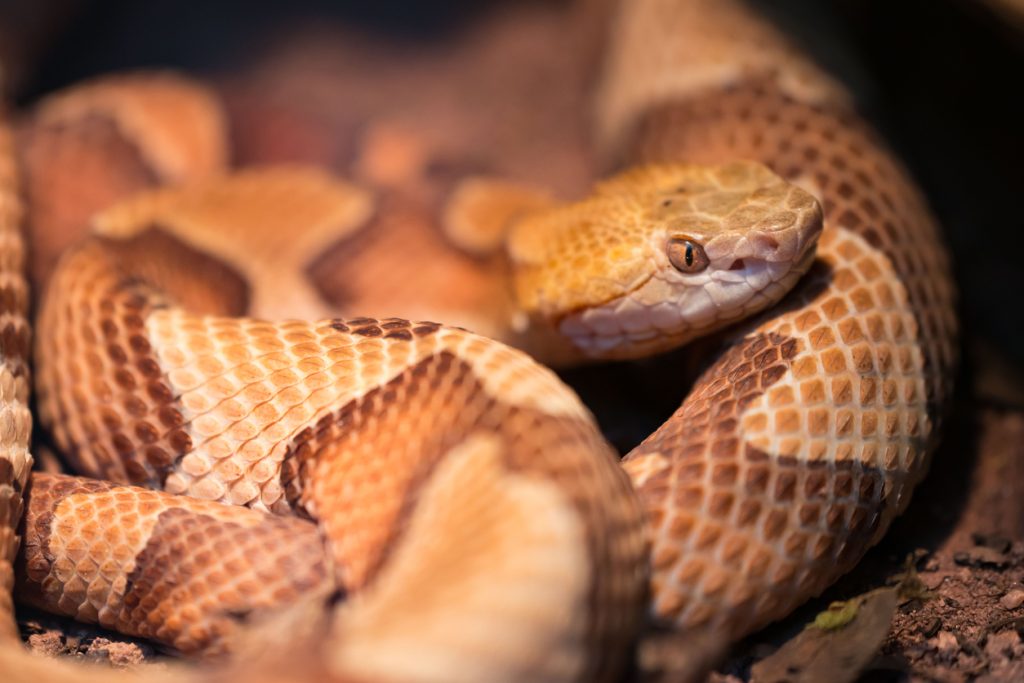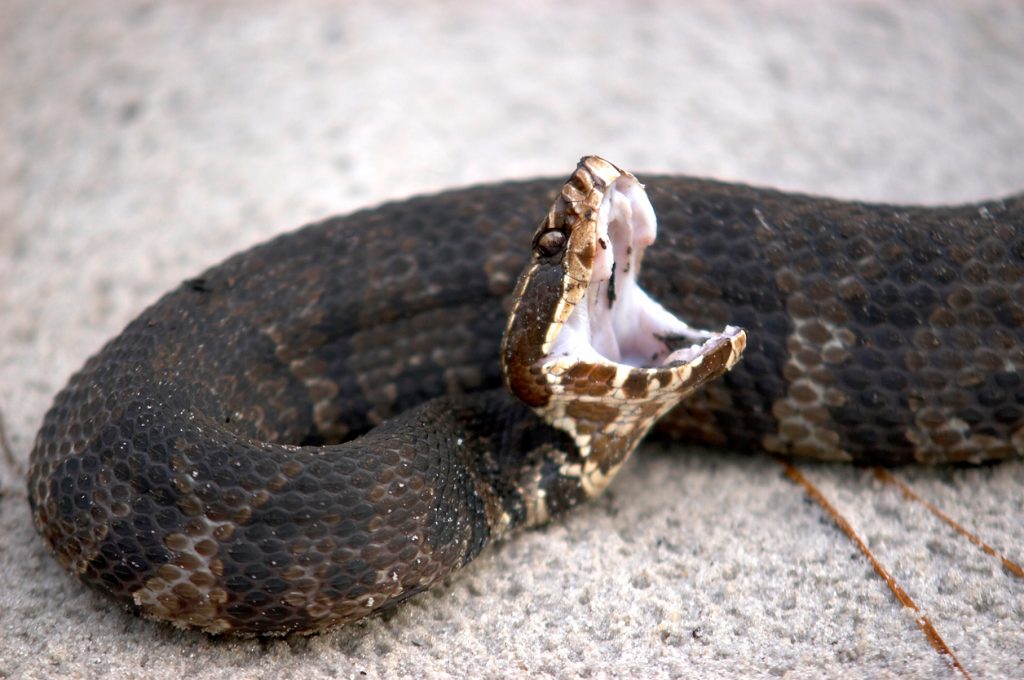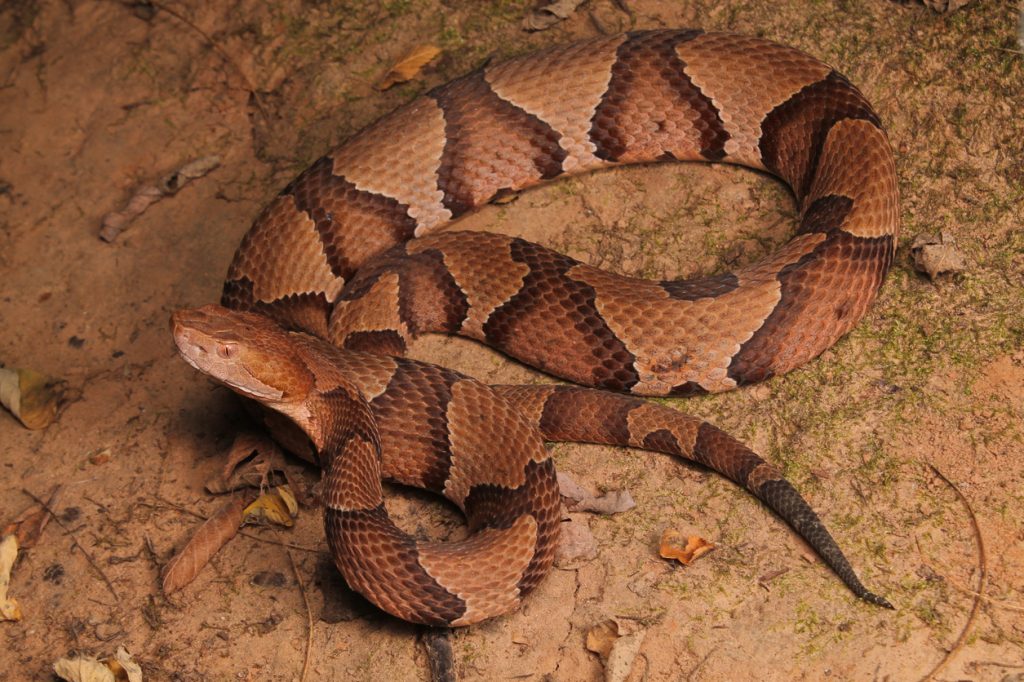Spike in Sightings Reported Amid “Really Nasty Snake Year”—How to Avoid Them

For many people, the return of warm weather is something to look forward to each year as we begin to spruce up our yards, reopen the pool, and prepare to spend more time in nature. But along with green foliage and longer days, the spike in temperature also coincides with the return of venomous snake season. Like any natural cycle, each round can bring different conditions—and now some experts are reporting a spike in sightings amid what they’re calling a “really nasty snake year.” Read on to see how you can avoid them and stay safe.
READ THIS NEXT: Venomous Snake Spotted Swimming Across Lake: “This Is a New Fear”.
Reports of venomous snake sightings are up after an early start to the season this year.

It’s only natural to want to spend some time outdoors once spring begins to hit its full bloom. But this year, experts say that venomous snakes like copperheads have become much more active than usual as the weather continues to warm up.
“We knew when we were getting snake calls in January and February … we were in for a really nasty snake year because that’s basically unheard of,” Rich Perry, owner of Virginia Wildlife Management and Control, told local NBC affiliate WWBT.
Perry tells the news outlet he’s getting more than 40 to 50 calls per week to deal with removing the reptiles from homes and properties across Virginia. He’s also getting sent far more photos documenting potential sightings than ever before, with upwards of 250 images sent to his phone each day.
Most snake bites occur when someone doesn’t notice the animal or attempts to touch or move it on their own.

Feeling a little anxious about coming across a venomous snake is perfectly normal. But despite the healthy fear of wanting to keep your distance, experts point out that they’re actually non-aggressive towards humans by nature.
“Snakes don’t chase after you. They’re not just gonna come after you. If you see a snake, even if it is venomous, leave it alone, leave it be, and it’ll eventually go off on its own,” Perry told WWBT.
In most cases, close encounters happen when a snake is either highly camouflaged and hiding, when someone simply doesn’t think to look out for them, or when they try to take matters into their own hands. “A lot of people get themselves in trouble if they don’t realize the snake could be there, or they intentionally come in contact with a snake, so it’s just one of the other things you have to be smart about or aware of when you’re spending time outdoors,” Kristen Wiley, co-director of the Kentucky Reptile Zoo, recently told local CBS affiliate WYMT.
RELATED: For more up-to-date information, sign up for our daily newsletter.
You can avoid getting bitten by being especially careful in certain areas.

It can be difficult to steer clear of snakes because they naturally like to hide and disguise themselves, but there are a few regular spots where you should be be extra cautious.
“Places that humans would see a lot that have great cover for snakes would be firewood piles, underneath dog bowls or toys that would be left outside, underneath tarps, piles of leaves or sticks, natural debris, would be good hiding places for snakes,” Kat Dale, lead zookeeper at the Kentucky Reptile Zoo, told WYMT.
The same goes for areas around your home where you might otherwise forget about the potential danger. “Normally, it’s somebody … clearing out a garden under the bushes [when they get bitten]. Occasionally, they’ll walk out upon them at night, on their back step or front porch, but almost always snakes are biting [in] self-defense,” Ruddy Rose, MD, director of the Virginia Poison Center, told WWBT.
Experts say you should seek medical attention immediately if you get bitten by a snake.

Even if you’re careful enough and keep your eyes peeled, it can still be difficult to spot every snake hiding near your path. That’s why experts suggest being more cautious with your clothing choices.
“If you’re outside wearing shoes, and not flip flops or sandals, particularly if you’re hiking, wearing good boots,” Rose told WBBT. “If you make a lot of noise, typically, snakes will know you’re coming, and will stay away from you.”
If you wind up with a snake bite, Rose says to seek medical attention as quickly as possible. You should also avoid applying ice or pressure to the wound and certainly avoid trying to suck the venom out of the injury yourself. “If you got envenomated, it’s going to swell, usually within 30 minutes or so, and it’s going to hurt, and the more it swells, the more it hurts,” he told WWBT.
Perry also points out that it’s illegal in most places to kill venomous snakes. But even if the idea of having reptile neighbors bothers you too much, it helps to remember that they’re still essential inhabitants.
“Snakes are important to have around. It’s not good just to kill them for the sake of it because they play an important role in the ecosystem: They eat rodents, [and] they eat parasites that rodents carry, so things like ticks are reduced by the presence of snakes, so they do have a role to play,” Dale told WYMT.